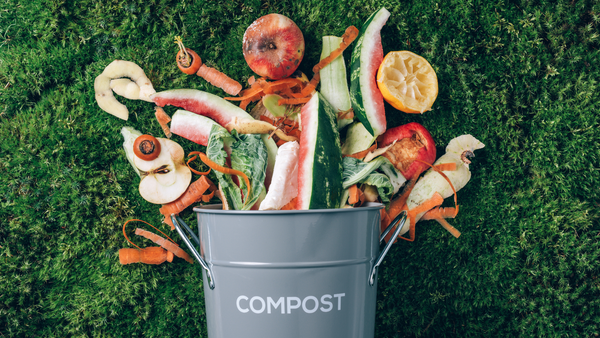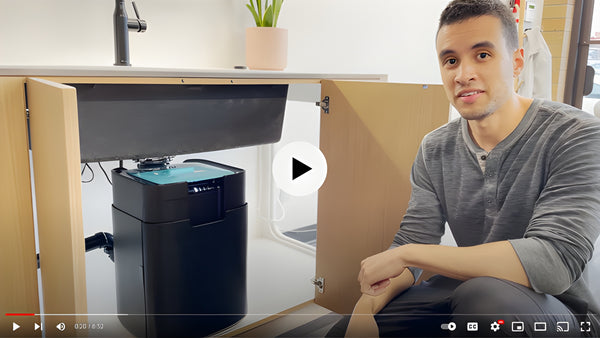Are you looking for a sustainable way to reduce food waste in your home? Look no further than a sink composter. This innovative appliance allows you to easily compost food scraps from the convenience of your kitchen, without the smell. But how do they work? And what are they called? Keep reading to learn everything you need to know.
What is a Sink Composter and how does it work?
A sink composter is an appliance that allows you to put food scraps directly down the drain, without needing to call a plumber. These devices separate food scraps, moving them to a bin under your sink allowing you to compost them later.
A sink composter is a simple and efficient way to reduce food waste and create nutrient-rich compost for your garden. But how does it work? Let's take a closer look.
Sepura uses a precision auger to separate the solids from liquids. The auger rotates, pushing solids into a collection bin under your sink without the use of any crushing or chopping. This careful process ensures that only liquids are sent down your drain.
Fun Fact:
With a separation accuracy of 99.9%, this appliance can be confidently used on septic fields without fear of damaging the system.
These devices are also commonly equipped with carbon filters to prevent any odors from escaping into your kitchen.
What is a Sink Composter called?
Sink composters are also commonly known as under-sink composters, food scrap disposals, or garbage disposal replacements. They are a convenient and eco-friendly alternative to traditional composting methods. These devices are specifically designed to handle food scraps and other organic waste that would otherwise end up in landfills.
Now let's talk about the different types available in the market. There are two main options: electric and manual.
Electric versions like Sepura, use a motorized auger to move food scraps into a collection bin. These units are typically installed under the sink and come with a wireless button to activate the composter. As you scrape your plates into the sink, the scraps are taken by the auger and moved into the collection bin. Liquids flow down the drain as normal.
Manual variants, on the other hand, are simple and require no electricity. These composters consist of a collection bin that typically sits under the sink and a strainer that sits in the sink drain. As you scrape your plates into the sink, the scraps are caught by the strainer and eventually make their way into the collection bin. This type of composter requires frequent manual cleaning, emptying, and often give off a foul odor.
Regardless of the type, these devices work by separating food scraps from liquids. The liquids flow down the drain and the solids are collected in a bin. Over time, the food scraps in the bin will break down and turn into compost, which can then be used to fertilize your garden.
One important thing to note is that they are not meant to replace outdoor composting. Rather, they are a convenient way to reduce food waste and separate compostable material from liquids with minimum effort from you.
The most popular brand is Sepura, which uses a motorized auger to move food scraps into a collection bin. Sepura is easy to install and use and comes with a wireless button to activate the composter. As you scrape your plates into the sink, the scraps are moved using a specialized auger and fall into the collection bin while liquids flow down the drain as normal.
In summary, there are a variety of models and features, from basic manual composters to high-tech electric models to suit every individual.
Why should you invest in an in-home composting system?
If you're still on the fence about whether or not a sink composter is right for you, consider these additional benefits:
- Convenient: These appliances are incredibly convenient and easy to use. With a composter under your sink, you can easily compost food scraps as you cook without having to open a rancid compost bin or operate a dangerous garbage disposal
- Reduced carbon footprint: By composting food scraps, you are diverting waste from the landfill, which reduces methane emissions and your carbon footprint
- Cost-effective: They are a cost-effective alternative to purchasing fertilizer or other soil amendments for your garden.
- Improved air quality: By composting food scraps, you are reducing the amount of waste that is sent to the landfill, which can help improve air quality in your community.
What are the benefits?
Sink composters provide several benefits for homeowners. One of the primary benefits is its convenience. It allows you to dispose of food waste right at the source, which can save you time and effort. You don't need to make frequent trips to an outdoor compost bin or worry about unpleasant smells from rotting food waste in your kitchen.
They can also help reduce the amount of food waste that goes into landfills. Instead, the food waste is converted into nutrient-rich compost that can be used to improve soil health and promote plant growth. This is an eco-friendly way to dispose of food waste, and it can help reduce greenhouse gas emissions.
These appliances also produce compost containing essential nutrients that can improve soil health, increase moisture retention, and reduce erosion. Using compost as a natural fertilizer can also help reduce the need for chemical fertilizers, which can be harmful to the environment.
Lastly, using a sink composter can result in cost savings as it can reduce the need for trash bags and waste disposal costs. Additionally, using compost as a natural fertilizer can help you save money on expensive commercial fertilizers and improve the health and productivity of your plants. Overall, a sink composter is an efficient and eco-friendly way to manage food waste and promote a sustainable home.
Tips for Using Yours
Once you have installed your sink composter, there are a few tips you can follow to get the most out of it:
- Avoid certain foods: These appliances are designed to handle most food scraps, but some items should be avoided, such as bones, eggshells, and large quantities of oil or grease.
- Keep it clean: Regularly cleaning your unit will help prevent any odors or clogs from forming. By changing the carbon filter in your unit every 3 months you will keep your house smelling fresh.
- Use compost in your garden: Once your collection bin has produced nutrient-rich compost, use it in your garden to improve soil health and grow healthy plants.
Final Thoughts
Sink composters are an innovative way to compost food scraps and organic waste in your kitchen without any unpleasant smell. They are installed under the sink and separate solids from liquids, with two main types: electric and manual. The most popular brand is Sepura, which uses a motorized auger to move food scraps into a collection bin.
Using a sink composter offers numerous benefits, such as convenience, reduced waste, improved soil health, cost savings, and environmental friendliness. Sepura is septic-friendly, odor-free, and whisper-quiet, with LED indicators that signal when the bin needs emptying.
The indoor variant is not meant to replace outdoor composting but provides a convenient way to separate compostable material from liquids with minimum effort from the user while in the kitchen. Overall, investing in a sink composter is a smart choice for anyone looking to reduce their environmental impact and create a more sustainable home.



